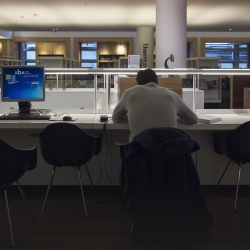To provide the best experiences, we use technologies like cookies to store and/or access device information. Consenting to these technologies will allow us to process data such as browsing behaviour or unique IDs on this site. Not consenting or withdrawing consent, may adversely affect certain features and functions.
The technical storage or access is strictly necessary for the legitimate purpose of enabling the use of a specific service explicitly requested by the subscriber or user, or for the sole purpose of carrying out the transmission of a communication over an electronic communications network.
The technical storage or access is necessary for the legitimate purpose of storing preferences that are not requested by the subscriber or user.
The technical storage or access that is used exclusively for statistical purposes.
The technical storage or access that is used exclusively for anonymous statistical purposes. Without a subpoena, voluntary compliance on the part of your Internet Service Provider, or additional records from a third party, information stored or retrieved for this purpose alone cannot usually be used to identify you.
The technical storage or access is required to create user profiles to send advertising, or to track the user on a website or across several websites for similar marketing purposes.
 Loneliness is increasingly recognised as a serious issue in modern society. In the UK, the Office of National Statistics reported that 5 percent of adults feel lonely ‘often’ or ‘always’, with further 16 percent of adults reporting feeling lonely ‘sometimes’, equivalent to approximately 9 million adults suffering from loneliness to some degree. (more…)
Loneliness is increasingly recognised as a serious issue in modern society. In the UK, the Office of National Statistics reported that 5 percent of adults feel lonely ‘often’ or ‘always’, with further 16 percent of adults reporting feeling lonely ‘sometimes’, equivalent to approximately 9 million adults suffering from loneliness to some degree. (more…)













 UK employers claimed £35 billion of free labour last year because of workers doing unpaid overtime, according to an analysis of official statistics published today by the
UK employers claimed £35 billion of free labour last year because of workers doing unpaid overtime, according to an analysis of official statistics published today by the 


 Employers should prepare themselves for a dramatic rise in staff taking shared parental leave, a new
Employers should prepare themselves for a dramatic rise in staff taking shared parental leave, a new 
 Policy makers should resist claims by Uber that its drivers fall into a middle ground between traditional employees and independent contractors, a new study says. The research report,
Policy makers should resist claims by Uber that its drivers fall into a middle ground between traditional employees and independent contractors, a new study says. The research report, 


 Following reports that job applications on the first working Monday of the New Year spiked by 89 percent compared to the average Monday in December, many UK businesses may be missing a trick in their efforts to retain staff, new research has suggested. When researchers commissioned by
Following reports that job applications on the first working Monday of the New Year spiked by 89 percent compared to the average Monday in December, many UK businesses may be missing a trick in their efforts to retain staff, new research has suggested. When researchers commissioned by 










April 6, 2020
So what sort of homeworker are you?
by Sarah Booth • Comment, Flexible working